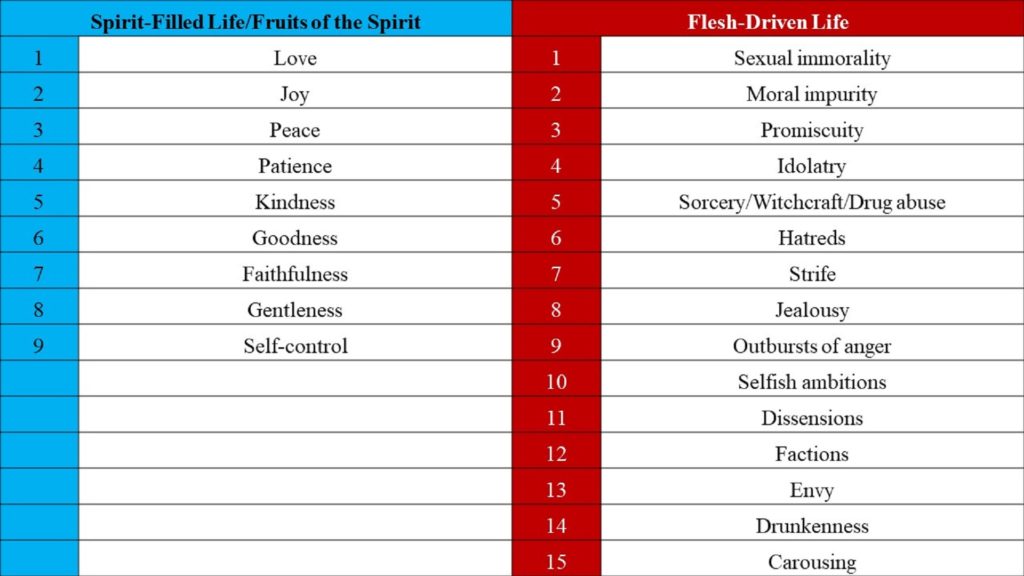By: Brian G. Chilton | August 20, 2019
Growing up, I spent a lot of time with my grandparents, Roy and Eva Chilton. They owned a small farm in rural, northwestern North Carolina. They had both retired from tobacco farming by the time I was born. Nevertheless, my grandpa usually sowed a fairly large garden each year. My grandmother had planted numerous fruit trees which would provide a sweet, delectable scent during the hot, North Carolina summers. It was often just a pleasure to walk out in their backyard and breathe. She had planted apple trees, a pear tree, a cherry tree, a strawberry patch, blackberries, and a grapevine that produced luscious grapes. I envision heaven being much like my grandparents’ backyard.
The biblical writers often connect fruitfulness with spiritual fulness. A person filled with the Holy Spirit and living a life directed by God is often called fruitful. Jesus compared people who follow the will of the Lord with good trees that produce good fruit (Matt. 12:33). However, individuals who live carnal lives which are undirected by God are called bad trees that produce little or no fruit (Matt. 12:35). Paul picks up this theme, as well. In Galatians 5, he contrasts the spiritually fruitful life in Christ to that of the flesh—that is, a life directed to its own pursuits.

Spiritual Fruitfulness
The spiritually fruitful life is described by nine terms. This is interesting because symbolically the number 9 is a symbol of divine action or completeness (see https://bellatorchristi.com/2018/01/09/reference-guide-to-biblical-numerology/ for further details). Christ died at the ninth hour and Yom Kippur—the Day of Atonement—occurs on the ninth day of the seventh month (Lev. 23:32). Thus, it is of no surprise that the fruit of the Spirit comes in nines.
Love (agapē). Love is the first fruit mentioned probably because it is of the utmost importance in a Christian’s life. Loving behavior comes by the loving presence of the Holy Spirit working in a person’s life. A person loves because one has been loved by God. C. S. Lewis notes, “God, who needs nothing, loves into existence wholly superfluous creatures in order that he may love and perfect them. He creates the universe, already foreseen—or should we say ‘seeing’? there are no tenses in God—the buzzing cloud of flies about the cross, the flayed back pressed against the uneven stake, the nails driven through the mesial nerves, the repeated incipient suffocation as the body droops, the repeated torture of back and arms as it is time after time, for breath’s sake hitched up.… This is the diagram of love Himself, the inventor of all loves” (Lewis, The Four Loves, 176).
Joy (chara). Joy is related to hope. Joy is the exuberant confidence that God will work out all things. Paul encourages believers to rejoice in the Lord (Rom. 5:11; Phil. 3:1; 4:4). A believer should not be overly depressed if one truly expects God to fulfill his promises. One should be a continual optimist despite the pessimism of the world. In contrast to happiness, which is fleeting; joy is a state of being.
Peace (eirēnē). Peace does not come from the absence of conflict or unpleasant circumstances. Peace comes from a mental and spiritual state of well-being. The NT concept of peace is closely related to the Hebrew understanding of shalom which is a state where one is right with God and one’s fellow human beings. Peace stems out of living a life directed by the Two Great Commandments—loving God and loving each other.
Patience (makrothymia). Patience is defined by John Calvin as a state of mind which takes “everything in good part and not easily to be offended” (Calvin, CNTC 11.105). Having patience means that a person doesn’t live with the proverbial chip on one’s shoulder, but rather indicates the long-suffering one has even with irritating and difficult people. This stems out of the patient characteristics of God who put up with Israel and all God’s people despite ongoing blatant rebellion (Hos. 11:8).
Kindness (chrēstotēs). In contrast to the Galatians who were backbiting and devouring one another, Paul called for the believers to treat one another with kind words and deeds. Like all the fruit of the Spirit, kindness stems from God who grants the ability to be kind (Rom. 2:4).
Goodness (agathōsynē). Goodness indicates the benevolence and kindness that one has for another. Goodness is like kindness. However, Paul has in mind someone who goes the extra mile for a person. In like manner, God continuously extends his goodness to all creatures on earth.
Faithfulness (pistis). The term pistis often refers to a faith which is one’s trust and wholehearted dependence on God. Paul uses pistis, in this case, to refer to a person who is totally dependent, trustworthy, and reliable. Here again, this fruit comes by the abiding faithful nature of God (Rom. 3:3). Millard Erickson defines God’s faithful nature by the following, “If God’s genuineness is a matter of his being true and veracity is his telling of the truth, then his faithfulness means that he proves true” (Erickson, Christian Theology, 3rd ed., 261).
Gentleness (pratēs). Gentleness indicates a submissive and teachable spirit. This submissive teachable nature lends itself to humility and consideration of others. Gentleness does not indicate one who is weak, but rather, as Timothy George states, “gentleness is strength under control, power harnessed in loving service and respectful actions” (George, Galatians, NAC, 404). In the biblical sense, a gentle person is one who does not try to impose one’s will upon another, but respects others while still making decisive decisions and holding firm convictions.
Self-control (enkrateia). Self-control indicates a mastery over one’s desires. It can refer to one controlling one’s temper and can certainly be used to describe one who has control over one’s sexual desires. In 1 Cor. 9:24–27, Paul compared the spiritual life to a professional boxer who undergoes intense training for a pending fight. In like manner, the Spirit-filled Christian allows the Spirit of God to steer one’s life rather than one’s own cravings and desires.
Spiritual Deadness
In contrast to spiritual vitality, Paul denotes fifteen traits that describe a person who walks by the flesh in Gal. 5:19–21.
Sexual immorality (porneia). The first three indicators of spiritual deadness are related to immoral sexual relations. Immorality indicates any form of sexuality that takes place outside the marital role. This includes fornication (sexual relations before marriage), adultery (sexual relations with a person who is not one’s spouse), and incest. These acts are actually the antithesis of true love and commitment. Adultery is faithlessness to one’s spouse.
Impurity (akatharsia). Impurity, or uncleanness, denotes the defilement that sin brings in one’s relationship with God and others. Thus, sexual immorality brings about impurity which affects one’s spiritual walk with Christ.
Debauchery (aselgeia). Debauchery speaks of a loss of limitations placed upon oneself and the blatant disregard one has for God’s concern for one’s actions. Said another way, a debaucherous person no longer cares what God thinks about one’s actions. One only cares about one’s own desires.
Idolatry (eidōlolatria). Idolatry is the worship of anything that is not God. This could be false gods such as the Canaanite fertility god Baal. Or, it could be gadgets and toys. A Corvette could be an idol if one is not careful. In addition, objects in church can become idolatrous if congregations are not careful.
Sorcery/witchcraft (pharmakeia). While we get our modern word pharmacy from the word pharmakeia, the term does not speak of one’s use of prescription medications. Rather, the term speaks of witchcraft, black magic, and demonic control. The term can also refer to the abuse of drugs. Thus, witchcraft, black magic, demonic consultation, and drug abuse are all found within this one overarching term. All the aforementioned practices are to be avoided.
Hatred (echthrai). Paul notes that quarrels and hostile behaviors are opposed to the loving nature of God and speaks more of the sinful mind of humanity. Unresolved hatred speaks of a mindset that opposes God (Rom. 8:7).
Discord (eris). Discord refers to a person’s motives which are self-centered rather than God-focused. Some preached the gospel for envious and rivalrous motives (Phil. 1:15). This should be a warning for all ministers of God. It is sometimes possible to do God’s work with wrong motives which will lead to bad ends.
Jealousy (zēlos). Jealousy is the opposite of patience. A jealous person always wants what someone else has. Such a person is never content with one’s own possessions. Gratitude is almost never found in a jealous person. Paul says that this is not a characteristic of fruitful life, but one of spiritual deadness.
Outbursts of anger (thymoi). Outbursts of anger contrast greatly with the self-control found in the Spirit-filled life. Uncontrollable verbal and physical violence NEVER bodes well for any person, much less for a child of God.
Selfish ambitions (eritheiai). Interestingly, the term eritheiai has its roots with political campaigning. Aristotle uses the term to refer to one seeking political office or “canvassing for office” (Aristotle, Politics 5.2.9.). Thus, a life lived by selfish ambition is one that only seeks to promote oneself. While politicking is bad enough in politics, it is even worse when politics enters the church. Christians are not called to promote their selves, but rather they are to promote Christ.
Dissensions (dichostasiai). Only here in Gal. 5:20 and in Rom. 16:17 does Paul use the term dichostasiai. In both instances, the apostle refers to individuals who put stumbling blocks in front of another person. It speaks of a person trying to lead astray believers from the truths of Christ and from the unity and harmony that needs to be found in the local assembly. Paul warns to stay away from a person causing divisions.
Factions (haireseis). The term haireseis was later devised into the English word heresy. In both instances, it refers to a person who deliberately chooses to advocate a doctrine that is at odds with the essential doctrines of Christianity. It also references the choice to create divisions within the church due to lesser matters.
Envy (phthonoi). The envy described by Paul denotes an unacceptable rivalry that develops from contentious persons or groups. The root behind these rivalries is jealousy. Like the previously mentioned fleshly traits, envy brings division and discord among individuals, groups, and congregations. Such behavior is not acceptable in the Christian’s walk with God.
Drunkenness (methai). This term is self-explanatory. In the Roman Empire, abuse of alcohol was prevalent in urban life. Paul notes that the child of God should be filled with the Spirit rather than being drunk with wine (Eph. 5:18). Excessive drinking leads to bad ends and depicts a life that no longer is able to cope with the uncertainties of life. It does not speak well of a child of God.
Carousing/orgies (kōmoi). Drunkenness leads to bad ends. This is what kōmoi indicates. Drunkenness may lead to sexual infidelity, abuse in the home, and chaos with individuals one meets. This leads to the door of a depraved mind and should be avoided by the child of God.
Both lists compare and contrast the Spirit-filled life with the flesh-led life. Three things come to mind when considering a fruitful life. First, the criticism against Christianity against Christians behaving badly loses its power when considering the moral edicts provided by the Bible. It appears that God is even more upset by believers who live a lifestyle driven by fleshly desires and power-driven mentalities even more than we are. So, such criticism loses its impact when considering the Christian moral code of holiness. The problem is not with Christianity. Rather, it is with flesh-driven people who either have lost touch with their relationship with Christ or never had a genuine transformation in Christ.
Second, demonstrating the fruit of the Spirit is only possible by a personal relationship with a holy God. The fruit of the Spirit all stem from God’s attributes. God is all-loving, full of joy, peaceful, patient, kind, the absolute good, trustworthy (Titus 1:2), gentle, and provides one with self-control. None of these can be achieved by human effort alone. The fruits are manifestations of God’s working in a person’s life.
Third, each person should self-evaluate oneself to see if one is producing fruit. Obviously, fruit is not produced from within oneself. But rather, it comes from one’s submissiveness to God. If you are not seeing the fruit of the Spirit emanating from your life, either you need to accept Christ as your Savior, or you need to submit yourself to him.

About the Author
Brian G. Chilton is the founder of BellatorChristi.com, the host of The Bellator Christi Podcast, and the author of the soon to be released book The Layman’s Manual on Christian Apologetics. He received his Master of Divinity in Theology from Liberty University (with high distinction); his Bachelor of Science in Religious Studies and Philosophy from Gardner-Webb University (with honors); and received certification in Christian Apologetics from Biola University. Brian is currently enrolled in the Ph.D. program in Theology and Apologetics at Liberty University and is a member of the Evangelical Theological Society and the Evangelical Philosophical Society. Brian has been in the ministry for nearly 20 years and serves as the Senior Pastor of Westfield Baptist Church in northwestern North Carolina.
© 2019. BellatorChristi.com.





